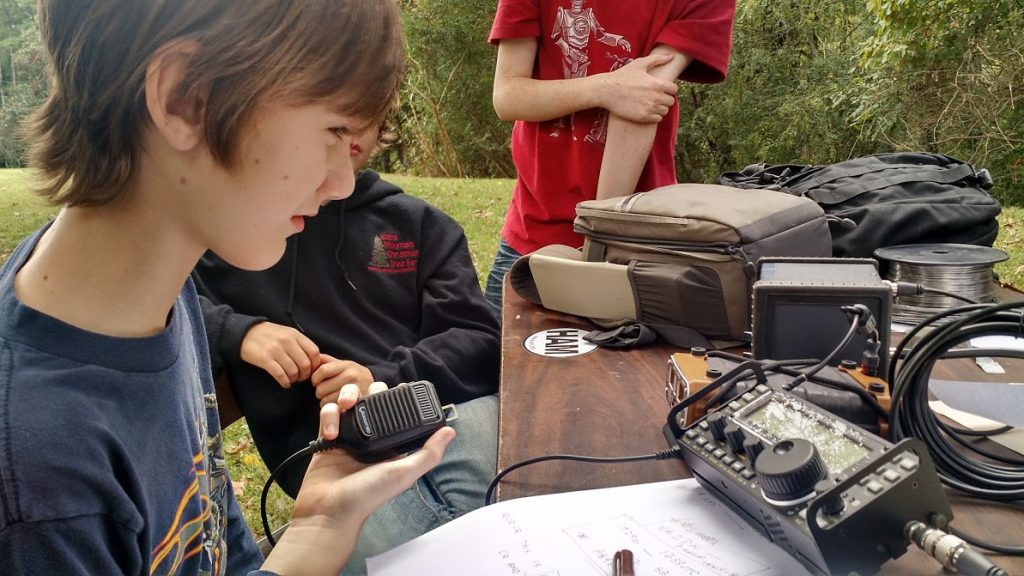(Source: Southgate ARC)
The FCC has invited public comments on ARRL’s 2018 Petition for Rule Making, now designated as RM-11828, which asks the FCC to expand HF privileges for Technician licensees to include limited phone privileges on 75, 40, and 15 meters, plus RTTY and digital mode privileges on 80, 40, 15, and 10 meters.
Interested parties have 30 days to comment. The Technician enhancement proposals stemmed from the recommendations of the ARRL Board of Directors’ Entry-Level License Committee, which explored various initiatives and gauged member opinions in 2016 and 2017.
“This action will enhance the available license operating privileges in what has become the principal entry-level license class in the Amateur Service,” ARRL said in its Petition. “It will attract more newcomers to Amateur Radio, it will result in increased retention of licensees who hold Technician Class licenses, and it will provide an improved incentive for entry-level licensees to increase technical self-training and pursue higher license class achievement and development of communications skills.”
Specifically, ARRL proposes to provide Technician licensees – both present and future – with:
* Phone privileges at 3.900 to 4.000 MHz, 7.225 to 7.300 MHz, and 21.350 to 21.450 MHz.
* RTTY and digital privileges in current Technician allocations on 80, 40, 15, and 10 meters.The ARRL petition points out the explosion in popularity of various digital modes over the past 2 decades. Under the ARRL plan, the maximum HF power level for Technician operators would remain at 200 W PEP. The few remaining Novice licensees would gain no new privileges under ARRL’s proposal.
ARRL’s petition points to the need for compelling incentives not only to become a radio amateur in the first place, but then to upgrade and further develop skills. Demographic and technological changes call for a “periodic rebalancing” between those two objectives, ARRL maintained in his proposal. The FCC has not assessed entry-level operating privileges since 2005.
The Entry-Level License Committee offered very specific data- and survey-supported findings about growth in Amateur Radio and its place in the advanced technological demographic, which includes individuals younger than 30. It received significant input from ARRL members via more than 8,000 survey responses. “The Committee’s analysis noted that today, Amateur Radio exists among many more modes of communication than it did half a century ago, or even 20 years ago,” ARRL said in its petition.
Now numbering some 384,500, Technician licensees comprise more than half of the US Amateur Radio population. ARRL stressed in its petition the urgency of making the license more attractive to newcomers, in part to improve upon Science, Technology, Engineering, and Mathematics (STEM) education, “that inescapably accompanies a healthy, growing Amateur Radio Service.”
ARRL said its proposal is critical to develop improved operating skills, increasing emergency preparedness participation, improving technical self-training, and boosting overall growth in the Amateur Service, which has remained nearly inert at about 1% per year.
The Entry-Level License Committee determined that the current Technician class question pool already covers far more material than necessary for an entry-level exam to validate expanded privileges.
ARRL told the FCC that it would continue to refine examination preparation and training materials aimed at STEM topics, increase outreach and recruitment, work with Amateur Radio clubs, and encourage educational institutions to utilize Amateur Radio in STEM and other experiential learning programs.
How to file your comment
(Source: ARRL)
Those interested posting brief comments on the ARRL Technician Enhancement proposal (RM-11828) using the Electronic Comment Filing System (ECFS) should access FCC Electronic Comment Filing System Express. In the “Proceeding(s)” field, enter the number of the PRM, i.e., RM-11828 (using this format), complete all required fields, and enter comments in the box provided. You may review your post before filing. All information you provide, including name and address, will be publicly available once you post your comment(s). For more information, visit “How to Comment on FCC Proceedings.”


I guess I’m just easily distracted off topic but looking at the pic at the top of this piece I immediately wondered what the radio was as it is a model I don’t recognize.
Having said that anything to get people engaged with non-screen tech is a good thing.
But I still want to know what the radio is…
Techs represent a sizable part of the ham population now. I’d add phone privileges for them on 10 meters too. Sounds like a good idea.
I agree, Mario.
This comment probably won’t be received well by the ARRL, but I have to say it. Personally, I will NEVER give any identifying information to the federal government for the “privilege”, actually a divine right, to use the airwaves. If mere competency is the issue, then why the need for a SSN, etc. in applying for a license? I could easily pass ANY test for an amateur license, but will NOT apply for one unless my license remains anonymous and based SOLELY on merit and competency.
Until the aforementioned is accomplished for a least ONE class of amateur license, as I’ve previously stated, the ARRL should be pushing a top-tier license with sufficient “privileges” for an amateur who accepts the responsibility for addressing issues of interference at the lowest level of government possible. Remove enforcement of such issues from the FCC itself by transferring those responsibilities to responsible amateurs.